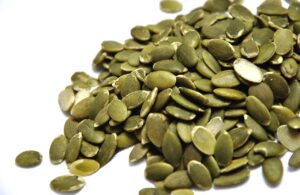Pumpkin Seeds and Their Benefits
Pumpkin seeds, also known as pepitas, are small, nutrient-dense seeds harvested from pumpkins. These edible seeds have been consumed for centuries and are packed with essential nutrients, offering numerous health benefits. Whether eaten raw, roasted, or added to dishes, pumpkin seeds are a good source of nutrition.
Nutritional Profile of Pumpkin Seeds
Pumpkin seeds are rich in vitamins, minerals, and antioxidants.
A one-ounce (28 grams) serving of pumpkin seeds contains:
Calories: Around 150
Protein: 7 grams
Fat: 13 grams (mainly healthy unsaturated fats)
Carbohydrates: 5 grams
Fiber: 1.7 grams
Magnesium: 37% of the daily recommended intake (RDI)
Zinc: 14% of the RDI
Iron: 23% of the RDI
Phosphorus: 33% of the RDI
Additionally, they are a great source of antioxidants and healthy plant compounds, including phytosterols and omega-3 fatty acids.

Health Benefits of Pumpkin Seeds
1. Rich in Antioxidants
Pumpkin seeds contain antioxidants such as carotenoids and vitamin E, which help reduce inflammation and protect cells from damage caused by free radicals. This can lower the risk of chronic diseases like cancer and heart disease.
2. Supports Heart Health
The high content of magnesium, healthy fats, and antioxidants makes pumpkin seeds beneficial for heart health. Magnesium helps regulate blood pressure, while unsaturated fats support healthy cholesterol levels. Studies have shown that consuming pumpkin seeds may reduce the risk of heart disease.
3. Aids in Better Sleep
Pumpkin seeds are a natural source of tryptophan, an amino acid that promotes better sleep. Magnesium in these seeds also plays a key role in improving sleep quality by calming the nervous system and relaxing muscles.
4. Improves Prostate and Bladder Health
Pumpkin seeds are particularly beneficial for men’s health. They help support prostate health and may reduce the risk of benign prostatic hyperplasia (BPH), a condition that causes the prostate gland to enlarge. Additionally, pumpkin seed oil has been found to improve urinary function and reduce symptoms of an overactive bladder.
5. Supports Immune System
The zinc and iron content in pumpkin seeds play a crucial role in strengthening the immune system. Zinc is essential for immune cell function, wound healing, and fighting infections. Regular consumption of pumpkin seeds may help protect against common illnesses.
6. May Help Regulate Blood Sugar Levels
Pumpkin seeds have been found to benefit people with diabetes or those at risk of developing the condition. Their high magnesium content helps improve insulin sensitivity and regulate blood sugar levels, reducing the risk of type 2 diabetes.
7. Promotes Digestive Health
Being a good source of fiber, pumpkin seeds contribute to a healthy digestive system. Fiber promotes regular bowel movements and prevents constipation while supporting the growth of beneficial gut bacteria.
8. May Reduce Cancer Risk
Studies suggest that diets rich in pumpkin seeds are associated with a reduced risk of certain types of cancer, including breast and prostate cancer. The presence of antioxidants and plant compounds like lignans helps in fighting cancerous cell growth.
How to Incorporate Pumpkin Seeds into Your Diet
Pumpkin seeds are incredibly versatile and can be enjoyed in various ways:
Eat them raw or roasted as a healthy snack.
Sprinkle them over salads, soups, or yogurt.
Add them to smoothies for an extra nutritional boost.
Blend them into homemade granola or energy bars.
Use them as a crunchy topping for baked goods.
Conclusion
Pumpkin seeds are a nutrient-rich food that offers numerous health benefits, from supporting heart health to improving sleep and boosting immunity. Their versatility makes them an easy addition to a balanced diet. Whether eaten as a snack or added to meals, including pumpkin seeds in your diet can significantly enhance overall well-being.

